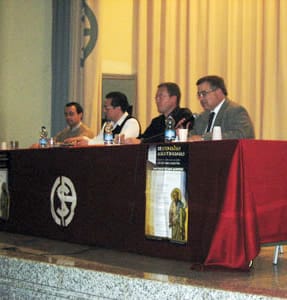A devote lover of St. Augustine, Benedict XVI said on February 27, 2008 in a General Audience dedicated to the saint of Hippo: “Just reading the letters of St Paul, in the faith of the Catholic Church, revealed to him fully the truth.” With this thought, conferences were organized with the two outstanding figures in Christian thought, Paul and Augustine, as focus of study and research.
Conferences
José Gutiérrez Anoz, a biblical scholar and a member of the Institute of Augustinology of the Order of Augustinian Recollects delivered a conference about “Paul in the debate of Augustine with the Manichaeans” and focused his study on the Pauline citations that Augustine uses in his De moribus ecclesiae Catholicae. Anoz said that based on his research, some Pauline citations are verbatim. Others have Pauline orientation, although his vivid and striking presentation and commentary were reduced to some texts, which for the lecturer, would gain an extraordinary weight in Augustine’s anti-Manichaean position. Among the Pauline texts cited by Augustine in this book, Anoz single out the text, “I am delighted to imitate as much I can the meekness of my Lord Jesus Christ,” explaining the implications of the phrase in the Augustinian thought. The speaker concluded that in this book written by Augustine not long ago after his conversion, philosophy, Christology, Trinitarian theology, ecclesiology and Christian morality are intertwined though incipiently to underscore the difference between the morality of the Catholic Church and Manicheans: The greatest tradition and Christian morality, are based especially on Romans 8, the primordial chapter of the Pauline letter; also on Romans 16, which is an invitation to treat the brother with consideration rather than yield to rigouristic pretensions; and on 1 Cor. 13, which commends charity.
Javier Monroy and Miguel Flores, Augustinian Recollects, have had the title of their conference, “How does God desire that all men be saved?” Monroy approached the theme as a biblical scholar and Miguel as an augustinologist. Both Pelagius and Augustine cited this fundamental text in soteriology, but the Augustinian position is differentiated from that of Pelagius when the African bishop maintains unequivocally that the salvific will of God is his Word, the man Jesus Christ, who is the only mediator between God and men, the Savior of all men. Christ being the only mediator, Augustine responds to how God wants that all men be saved: Christ is the “how” by being the only mediator.


The administration of CTSA proposed as subject of study and researche the presence and influence of Paul in Augustine and how Augustine read and interpreted the Pauline corpus. Days of Augustinology
The St. Augustine Theological Center, affiliated to the Pontifical University of Salamanca, holds every academic year days of conferences on themes of special importance and actuality. Besides the Augustinians, the Augustinian Recollect theologians of Las Rozas (Province of Saint Nicolas of Tolentine) and Torrente (Province of Our Lady of Consolation) participated in the said activity. The themes of the Days of Augustinology for the past three years have been: Vatican II council: 40 years after (2006); Restless youth: the Adventure of Living Christ (2007); and I baptize you in the name of the Father and of the Son and of the Holy Spirit – Ecumenism and Interreligious Dialogue – (2008). This year, in line with the celebration of the Pauline year, the administration of CTSA proposed as subject of study and researche the presence and influence of Paul in Augustine and how Augustine read and interpreted the Pauline corpus.


